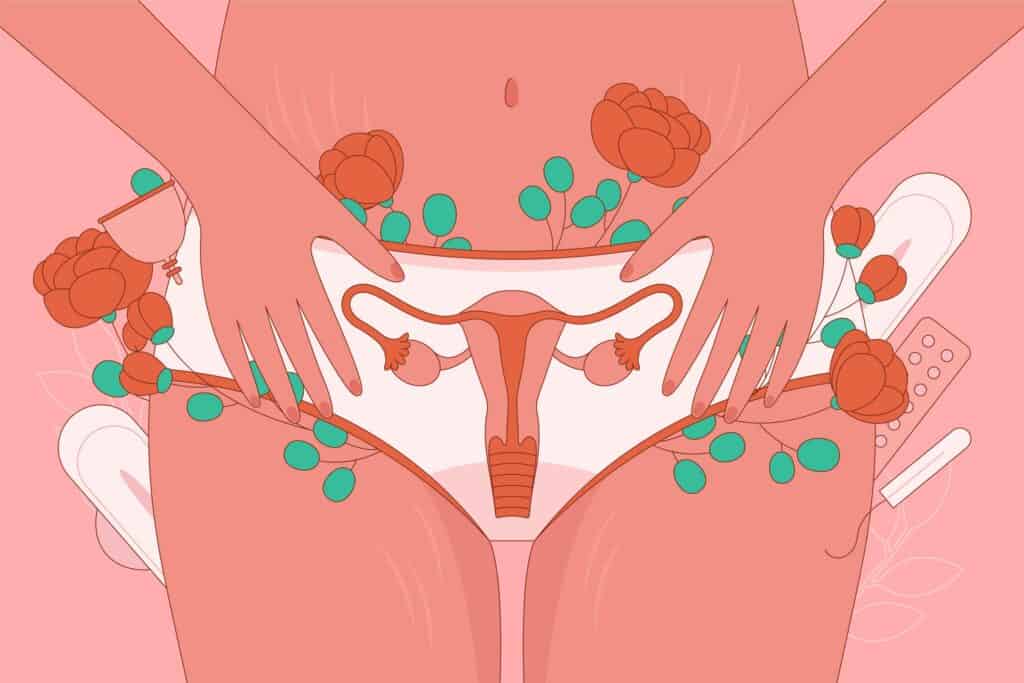Breakthrough Bleeding Condition Explained
Breakthrough bleeding is spotting that women experience throughout the normal menstrual cycle or even during pregnancy. This is common in the fertilization process especially.
If you have started taking birth control pills or other forms of contraception recently, then you may get a temporary breakthrough bleeding as well.
Although this is all normal, you should pay attention to any drastic changes in bleeding, pain, or any other symptom that may be a sign of additional underlying issues.
Here we will talk about identifying breakthrough bleeding or spotting, the causes for it, and how to know it’s time to see a doctor. But first, let’s start with the women’s normal periods.
The Regular Cycle Explained
The typical length of the menstrual cycle for women is 28 days long. Of course, this will depend on many medically reviewed lifestyle variables, affecting that period to be either as short as 21 days or as long as 35 days.
Day 1 of your cycle starts with your period, which lasts about 5 to 7 days. Then, when menstruation passes, an egg in your uterus is produced and prepared to be fertilized by the 14th day. Ovulation happens around this time, and you gear up towards conception all until the 20th day.
If not fertilized, the hormones prepare to shed the uterus lining to get rid of the egg. This results in another period that ends the current cycle and starts the next in about a week.
During menstruation, you lose about 2 to 3 tablespoons of blood. Teenagers and women nearing menopause will experience heavier bleeding, but this shouldn’t worry you.
However, if you have severe pain or bleed abnormally heavy, visit a health care professional to give you more information on your specific case.
When Does Breakthrough Bleeding Happen?

Breakthrough bleeding is any bleeding that you notice outside of your menstrual period. Technically, after the 7th day in your period.
This bleeding can be characterized by a heavy flow that can fill a pad or a tampon or be as small as spotting.
Here are some of the reasons why you might experience breakthrough bleeding.
- Patients are adjusting to hormonal contraception
- You got pregnant
- Experienced a miscarriage
Although light spotting may go away within a few days or in a matter of hours, it is still recommended to see your doctor and report the changes you are experiencing. Especially if you have never had a breakthrough bleeding before.
You are Adjusting to the Birth Control Pills
Women may bleed between cycles if taking any hormonal birth control pills or just had an IUD installed.
Such changes in the body will induce spotting that may last for a few months before resolving itself.
Pills like Ethinyl-estradiol-levonorgestrel, Seasonique, or Quartette, may also cause breakthrough bleeding. Unless it is significant quantities, rest assured that it will get resolved by itself without taking any pills.
When on the pill, you may experience such bleeding if you miss taking a pill throughout your period, if you start any new medications or supplements while taking it, or have diarrhea. The last one is especially prevalent since it can make your body unable to absorb the hormones from the pill.
Continuously taking birth control pills to skip your period effectively will also cause temporary bleeding that should resolve after several months.
You have nothing to worry about if you see that the blood you are experiencing is dark brown. This means that it isn’t new but old blood that needs clearing up from your system.
To know what to expect once you are on a birth control pill, we will review the side effects shortly. In the following content, you will find information on why you may experience bleeding or the spots when taking birth control pills and how to take care of it.
Combination birth control pills can cause some of the following side effects:
- Breakthrough bleeding or spotting. This is more common when the amount of the taken pills increases
- Breast tenderness
- Elevated blood pressure
- Headaches
- Nausea
- Bloating
Rest assured, because data shows that you can expect some of the side effects from the birth control pills, such as nausea, headaches, breast tenderness, and bleeding, to decrease with continued use.
To take better care of your health, it is essential to know that some people should not take birth control pills.
- You should not take a birth control pill if you are in breast-feeding
- Data shows, women who are older than 35 and smoke should also find an alternative for the pill
- Have poorly controlled high blood pressure
- You should not take any version of the birth control pill if you have a history of or current deep vein thrombosis or pulmonary embolism
- Have a history of stroke or heart disease
- If you have a history of breast cancer, you should not take a birth control pill
- If suffering from migraines with aura, then you should substitute the pill for another method
- Have diabetes-related complications, such as nephropathy, retinopathy, or neuropathy
- Women who have liver disease should not take any birth control pill
- If you have unexplained uterine bleeding, then stay off the pill
IUDs and Breakthrough Bleeding
IUDs as birth control methods will cause changes in your menstrual flow that need to clear up while your body adjusts to the influx of new hormones.
If you use a copper IUD, you will not get any new hormones, but you should expect some changes in your menstrual flow.
Vaginal bleeding between periods will be present with both types of IUDs as a side effect, but it will resolve in a few weeks up to a couple of months.
Usually, people bleed less from IUDs than when taking the birth control pill. Still, in the beginning, even their periods may get heavier until the body restores balance.
See your ob-gyn if your periods become uncommonly heavy, you experience pain in the lower part of your stomach, or you notice spotting or bleeding after sex.
Also, call your doctor if you have any of the following:
- Sharp abdominal pain shortly after the installation of the IUD
- Chest pain
- Very heavy bleeding like menstruation but between your cycles
- Eyesight or vision changes
- Severe leg pain
STDs and Vaginal Bleeding

STDs or other inflammatory conditions can cause breakthrough bleeding if left untreated for too long. Chlamydia and gonorrhea are often the cause of this, and women can go even 30 days before noticing that they have something.
Always have safe sex to protect yourself from getting and spreading STDs.
Other inflammatory conditions that can cause breakthrough bleeding or vaginal bleeding are:
- Cervicitis
- Endometritis
- Vaginitis
- Pelvic inflammatory disease (PID)
You may also experience sharp pelvic pain and burning and see cloudy urine in the toilet. Also, with such symptoms, abnormal vaginal discharge appears when the breakthrough bleeding decreases or simultaneously. Foul odor and itchiness may be present too.
If you have any of the described symptoms appropriated by vaginal bleeding, you should immediately see your doctor. Your doctor can effectively treat many of these conditions with over-the-counter antibiotics. However, if left untreated for too long, they may cause infertility and other serious health issues.
The Sensitive Cervix Issue
Any bleeding outside the normal cycle may worry you, especially if you are pregnant at the moment. Making sure all is well with your baby is your number 1 priority.
Although breakthrough bleeding during pregnancy may be a bad sign, sometimes it is caused by a sensitive cervix. If your cervix gets easily irritated or injured, then the vaginal bleeding is nothing to worry about except being more mindful and protect your intimate parts better.
The cervix is located at the base of your uterus. So, whenever you experience bleeding, it may mean that a recent irritation or injury has caused this and should go away pretty soon if not repeated.
A sensitive cervix is particularly common during pregnancy. It is because, at this particular period, the cervix becomes very soft. So, if you just had sex or went for a vaginal exam, breakthrough bleeding is expected and nothing to worry about.
Some women experience cervical insufficiency. This is a condition that happens when the cervix opens up earlier than your due date.
Breakthrough Bleeding Due to Subchorionic Hematoma
Subchorionic hematoma during pregnancy is also called hemorrhage and is a condition that may cause excessive vaginal bleeding.
When a woman has a subchorionic hematoma, her chorionic membranes separate from the sac, this occurs between the placenta and uterus and causes clots and bleeding.
The newly formed hematomas may be large or small hence cause breakthrough bleeding or spotting.
This condition isn’t serious in most cases, but you should schedule an appointment with your doctor to treat it.
Miscarriage or Ectopic Pregnancy and Breakthrough Bleeding

Not too often, women who experience breakthrough bleeding may be going through a miscarriage. The fetus may die in the first 19 weeks of the pregnancy, which will cause miscarriage. The causes of this may be numerous, and a definitive cause isn’t yet known.
Ectopic pregnancy is when the implantation occurs in the fallopian tube instead of the uterus. This pregnancy isn’t viable and has to be detected on time and, unfortunately, aborted. It may cause long-term damage to the mother’s health, especially the reproductive system, so taking action on time is of utmost importance.
These two conditions will have the following symptoms:
- Heavy bleeding
- Dizziness
- Severe pain or cramping in your abdomen
During a miscarriage, you may experience vaginal bleeding that lasts for 2 weeks or longer. If your uterus does not empty, you may need a dilation and curettage (D&C) or even a surgical procedure to remove the remaining tissue. Ectopic pregnancy, on the other hand, usually requires surgery.
Fibroids
Fibrous Masses or fibroids in your uterus will cause breakthrough bleeding. Anything from genetics to misbalanced hormones may cause this tissue to grow.
Apart from breakthrough bleeding, fibroids will also cause:
- Periods that last more than 7 days
- Very heavy bleeding
- Frequent urination
- Pain or pressure in your pelvis
- Trouble emptying your bladder
- Constipation
- Backache or pain in your legs
If you feel any of these symptoms, see your doctor as soon as possible.
Progestin-only Birth Control Pill
Apart from taking a regular contraceptive pill, there is another type for people who can’t take estrogen for health reasons.
These reasons can be anything from deep vein thrombosis (DVT) to age-related causes and smoking habits.
Namely, the type of pill you are using combined with other medications you may be taking can cause your bleeding.
Combination pills are the most commonly prescribed form of contraceptive. They combine progestin and estrogen and regulate your cycle.
However, if you are only taking the progestin pill, the bleeding may be more common and depend on the frequency of usage. This is because low doses of estrogen with higher amounts of progestin are associated with more bleeding episodes.
The breakthrough bleeding will occur in the first three to six months of use in 30% to 50% of the women. Then it drops to about 10 to 25% after the fourth month.
To keep the bleeding in check, you need to take the pill regularly. Research shows that missing your pill by just three hours significantly increases the risk of bleeding and the risk of pregnancy.
Breakthrough Bleeding Vs. Implantation Bleeding: How to Know?

How to know what you are experience is breakthrough bleeding or implantation bleeding?
Indeed this is sometimes even difficult for doctors to differentiate before examining you but knowing the difference can help you long-term.
You can mainly spot the difference because of the timing. Namely, bleeding or spotting 10 to 14 days after conception will be implantation bleeding. A normal condition that almost any woman experiences.
On the other hand, both the breakthrough and the implantation bleeding will occur between regular menstrual cycles. These two may come as spotting, for which you won’t need anything but a daily pad.
However, breakthrough bleeding may happen to you at any point in your life, while implantation bleeding only occurs a few days before a missed period. Consider it as a sign of pregnancy.
To quickly find which one it is, you can take a home pregnancy test or schedule an appointment at your doctors’ office for a blood test.
Note that when taking the pregnancy test, you should not have any blood in your urine. This will give you a false positive even if you aren’t pregnant.
Managing and Care: Medically Reviewed Advice
Whether caused by hormonal birth control pills, uterine fibroids, sexually transmitted infections, imbalanced hormones, breakthrough bleeding is an annoyance, and you will have to manage it somehow.
Firstly, you should visit your ob-gyn and get reliable health information on what’s causing you to bleed or have spotting between your periods. When you find out the reason behind this condition, depending on the causes, you can either wear a tampon or a pad.
For instance, if you have an overly sensitive cervix and the entire area down to the outer part of the vagina is inflamed, it is best to wear a pad.
On the other hand, if you are bleeding because of the hormonal birth control pill, you can wear a tampon. If the vaginal bleeding occurred because of a recent miscarriage, then pads on your underwear are better suited.
No matter the intensity of the bleeding, you should consult with a doctor. They will also give you some medically reviewed guidance on managing the bleeding in your particular case.
Breakthrough Bleeding Bottom Line

Vaginal bleeding is an unpleasant experience that needs medical attention. If you are experiencing this due to the birth control you’re taking or the irritation to your cervix, then you can wait it out for it to resolve on its own.
If, on the other hand, you have a genetic predisposition for fibroids, you suspect an STD or other medical issues, it is best to see a healthcare professional asap.
Women reaching menopause or recently in that period of their life will need to pay close attention to breakthrough bleeding. If you haven’t had a period in 12 months yet, you notice some bleeding at the moment, it is important to see your doctor. An infection or hypothyroidism may cause such symptoms in your situation.

